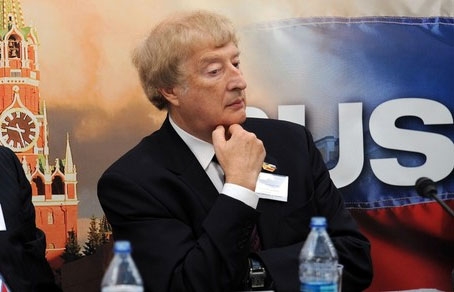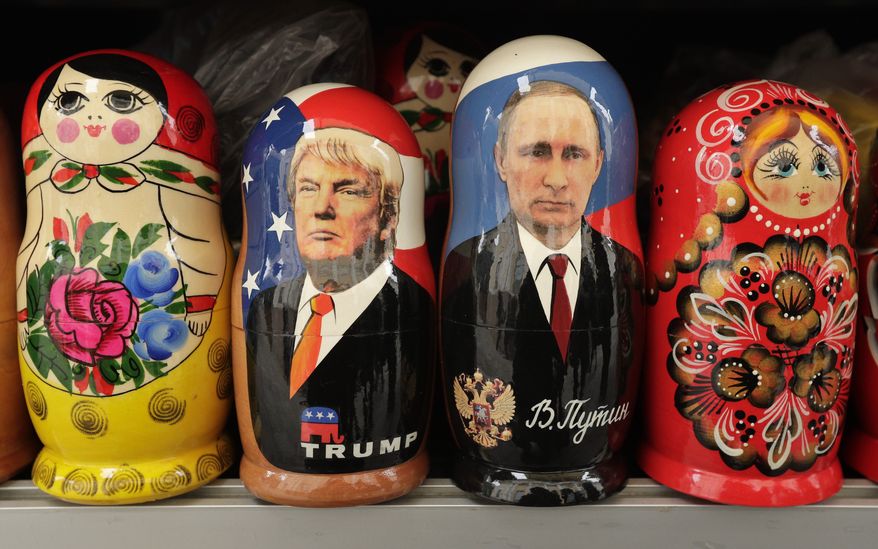

 US-Russia should dialogue on arms, elections, cyber security
US-Russia should dialogue on arms, elections, cyber security
 Photo by: Dmitri Lovetsky
Photo by: Dmitri Lovetsky
In this Monday, Feb. 20, 2017 photo, traditional Russian nesting dolls depicting US President Donald Trump, center left, and Russian President Vladimir Putin are displayed for sale at a souvenir street shop in St.Petersburg, Russia. While their country has become a daily source of headlines and political intrigue in the United States, most Russians are watching the drama over President Donald Trump's relationship with Moscow with resignation, even indifference. Russian media, state-owned and private, chronicle Mr. Trump's troubles matter-of-factly. Regular citizens generally care little about them. Many share the view that what's unfolded in Washington has dimmed prospects for the mended Russia-U.S. ties his candidacy represented here and thus have lost interest. (AP Photo/Dmitri Lovetsky, file)
Politicians and experts still debate whether the United States and
Recently I had a chance to talk to Sergey Rogov, the well-known and respected academic director of the USA and Canada Institute of the Russian Academy of Sciences, Moscow’s most influential think tank. Mr. Rogov perfectly understands that it’s unlikely that Washington and Moscow will soon make a U-turn and normalize their relationship. Sharp disagreements will persist for years to come. Effectively, Cold War 2.0 is permanent.
However, Mr. Rogov believes the situation may deteriorate even further unless both countries recall how the Soviet Union and the United States were able to avoid a nuclear Armageddon by negotiating mutual rules of the game through a set of political agreements and legally binding treaties.
Despite the current negative political climate Mr. Rogov had no problem meeting with many influential American foreign policy experts trying to promote his idea of convincing Washington to enter into negotiations with Moscow on at least three things which, even those who hit the ceiling when someone mentions word "Russia,” still might seriously consider.
According to Mr. Rogov, these rules of the competition seem to be almost forgotten, and the existing arms control regime is on the verge of a complete collapse. "The ABM [Anti-Ballistic Missile] and CFE [Conventional Forces in Europe] treaties are dead, and the INF [Intermediate-Range Nuclear Forces] treaty is in big trouble since each side accuses the other of violations. If the INF treaty crashes next year, the New START [Strategic Arms Reduction Treaty] hardly will survive in a vacuum,” Mr. Rogov says.
He proposes urgent three-point action to at least make sure that World War III doesn’t begin by accident, namely agreements to: 1. Prevent tactical military accidents; 2. Preserve the INF Treaty; and 3. Extend START-3. In the space of this commentary it is impossible to present the technical details of these three proposals but Mr. Rogov has already given them to his American colleagues, who are in a position to pass them on to the high places.
Being a realist, Mr. Rogov understands that no new arms reductions are possible since the U.S. Senate will not consent to legally binding new arms control treaties with Moscow in the foreseeable future. However, he believes that these limited goals seem to be achievable and concludes that "if we maintain the proposed rules of competition, we can also stabilize the military situation and prevent an unlimited arms race and balancing on the brink.”
If so, Mr. Rogov’s suggestion could also lead to broader U.S.-Russia political dialogue on cyber security, prohibition of meddling in other countries elections, resolving regional conflicts and other issues.
Mr. Rogov believes that Moscow is ready to start the dialogue. Will Washington join?
Edward Lozansky is president of the American University in Moscow.
Copyright © 2018 The Washington Times, LLC. Click here for reprint permission.
Edward Lozansky is president of the American University in Moscow, Professor of Moscow State and National Research Nuclear Universities. He is the author of the book "Operation Elbe”, which describes joint US – Russia anti-terrorist efforts.



.jpg/250px-ElbeDay1945_(NARA_ww2-121).jpg)





